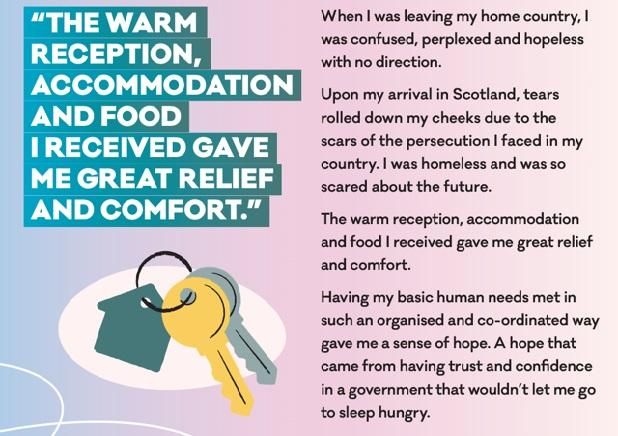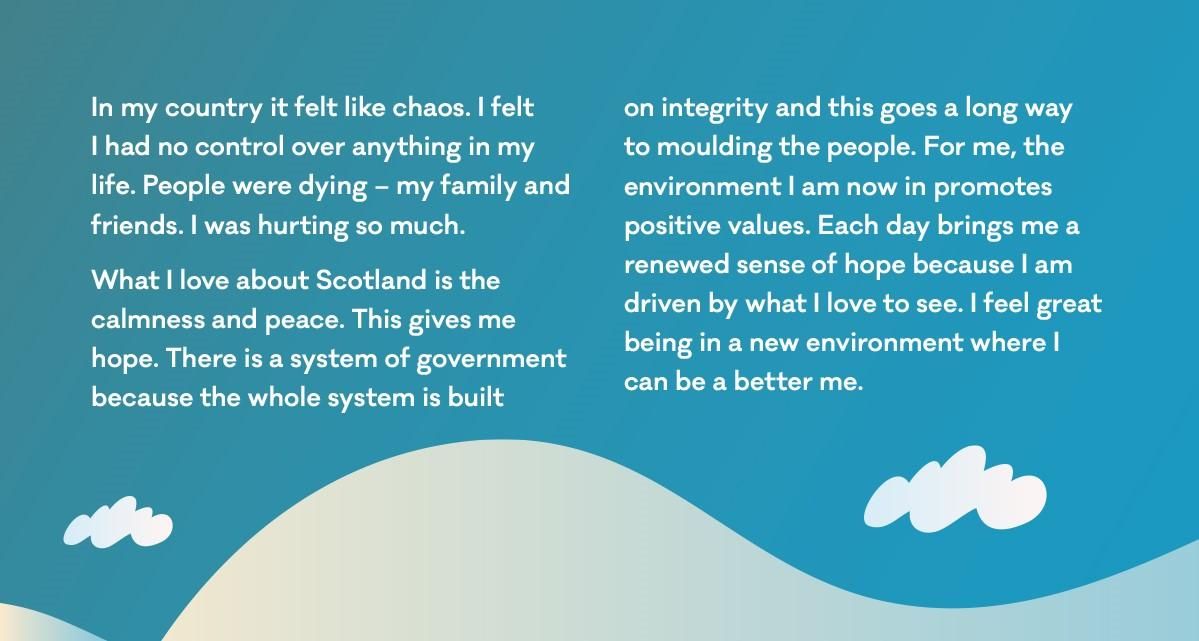This content mentions suicide or suicidal thoughts and trauma. Please read with care. There are details of where to find help at the bottom of this page.
When you are forced to leave everything and everyone you know behind, and all you can carry with you are memories often coated with trauma, you look for a glimmer of hope, something to lift you out of the darkness. These short stories shared by people in our refugee communities show what hope looks like.
As part of the Scottish Mental Health Arts Festival, we asked people who are refugees or asylum seekers living in Scotland about what gave them hope when they arrived here. Their words were used to create posters for the ‘This is What Hope Looks Like’ exhibition.
The stories provide an insight into the mental health impact of fleeing your home and seeking sanctuary. They also offer hope to people who may have recently arrived in Scotland and ideas for what may help them if they struggle with their mental health.
What gave me hope was hearing stories from individuals and families who came to Scotland ten years ago about their transition. Though these stories were not pleasant, they encouraged me to be resilient in order to overcome life challenges and realise my dreams.

When I was leaving my home country, I was confused, perplexed and hopeless with no direction.
Upon my arrival in Scotland, tears rolled down my cheeks due to the scars of the persecution I faced in my country. I was homeless and was so scared about the future.
The warm reception, accommodation and food I received gave me great relief and comfort.
Having my basic human needs met in such an organised and co-ordinated way gave me a sense of hope. A hope that came from having trust and confidence in a government that wouldn’t let me go to sleep hungry.

In my country, it felt like chaos. I felt I had no control over anything in my life. People were dying - my family and friends. I was hurting so much.
What I love about Scotland is the calmness and peace. This gives me hope. There is a system of government because the whole system is built on integrity and this goes a long way to moulding the people. For me, the environment I am now in promotes positive values. Each day brings me a renewed sense of hope because I am driven by what I love to see. I feel great being in a new environment where I can be a better me.

I came to the UK to seek political asylum. My involvement as a student activist meant I was being hunted by agents of the government in my country. I escaped through the border and fled to the UK. I became destitute and homeless and had to stay at the night shelter.
One of the volunteers there noticed how jovial I was despite my situation. Most of the time I would tell jokes and funny stories to my fellow residents. He asked me if I would consider stand-up comedy. I quickly learnt how to do this and I started writing comedy. I now have regular shows and a podcast. It gives me something to focus on. He connected me to his friend who was a stand-up comedian.
I am still waiting for a decision from the Home Office on my asylum case but I have something to keep me busy and I love it. This not only gives me hope, but it helps me to spread hope to others too. Once I get my papers I might go full time into stand-up comedy.

I consider acquiring higher education as the beacon of hope in Scotland. As an adult, I had no formal higher education when I worked as an Afghan interpreter for the British. However, as soon as I arrived in Scotland, accessing higher education opportunities was a priority for me.
After studying Access to Humanities at College, I was offered a place to study at four universities in Scotland. Despite having no access to higher education funds, I never lost my hope and continued to fight for my right until a Member of the Scottish Parliament suggested that I apply for asylum seeker tuition fees at the University of Edinburgh.
Finally, a tuition fee award by the University of Edinburgh fulfilled my dream, and I could pursue my education to a masters level.

The first thing that gave me hope when I came to Scotland was feeling safe. The second is information which I will say is power because it gave me hope that Scotland is a better place for me.
The ability to have reasonable access to information on rights, entitlements, education, health, etc. through friends, charity organisations and government agencies made me feel that I’m in a good place and, with time, living in Scotland will be the best thing that happened to me and my family.

I left my country to flee to the UK because my husband’s family tortured me. They wanted to do some family rituals on my children.
I came to UK and it was very cold and I felt so cold as if I was freezing.
The asylum process is not easy, it’s a very bad experience. After my first interview, I was refused. I felt like I should kill myself.
The second time I applied, the Home Office took me to court and they refused me again. The third time, I made a fresh claim which dragged on. I had a lot of things on my mind, I wanted to kill myself. Poor mental health is real.
My GP referred me to professionals to take care of me and introduced me to organisations to meet new people to talk to. We talked about our experiences, and I realised that it was important to speak out. I began to dream about a better future.
I learned to maintain my mental health by knowing that it is very important to say things out and not keep it to myself. I also go out walking every day.

Deciding to volunteer changed the trajectory of life for the better. I volunteered with the British Red Cross and this was a game changer in many ways. I trained as a First Aider and I began to immerse myself in the community, gained practical skills and knowledge which was important for my career development.
Furthermore, through volunteering I began to socialise and get to know the local people which helped me to feel less isolated and more engaged in some activity in my local area.
I still have vivid memories of some of the places that I volunteered in, for example George Square, Glasgow Green and Tollcross Park.

If you are feeling like ending your life or feel unable to keep yourself safe, please call 999 or go to A&E and ask for the contact of the nearest crisis resolution team. These are teams of mental health care professionals who work with people in severe distress. If you feel affected by the content you have read, please see our get help page for support.
Related content
Mental health resources for refugees and asylum seekers
Explore our resources to assist refugees and asylum seekers with their mental health.
Refugees and asylum seekers: statistics
Asylum seekers and refugees face unique and complex challenges related to their mental health. They are often at greater risk of developing mental health problems.
